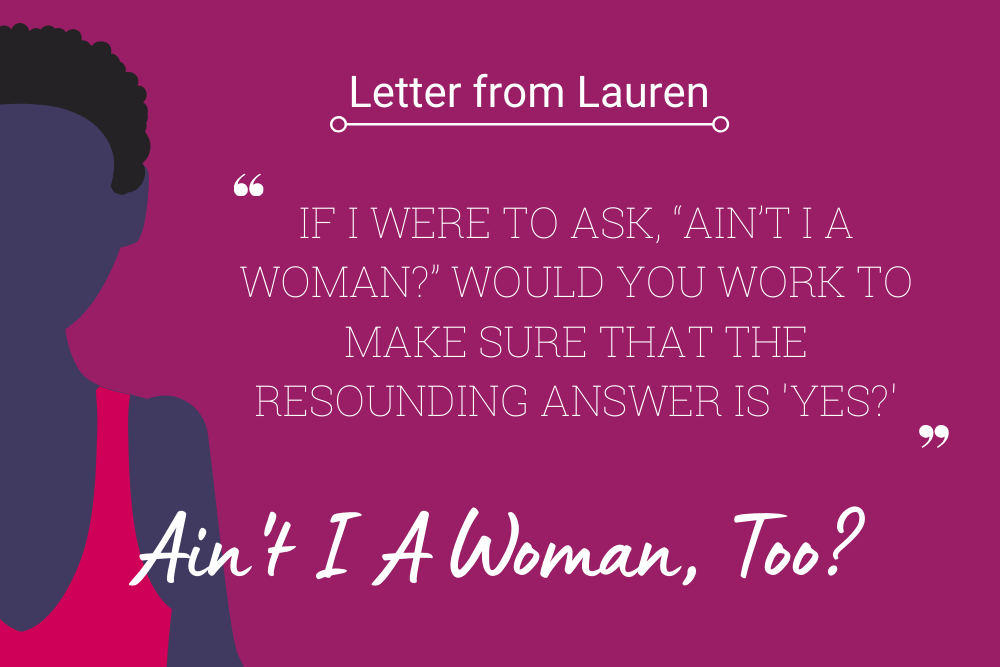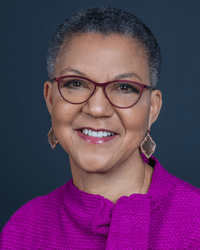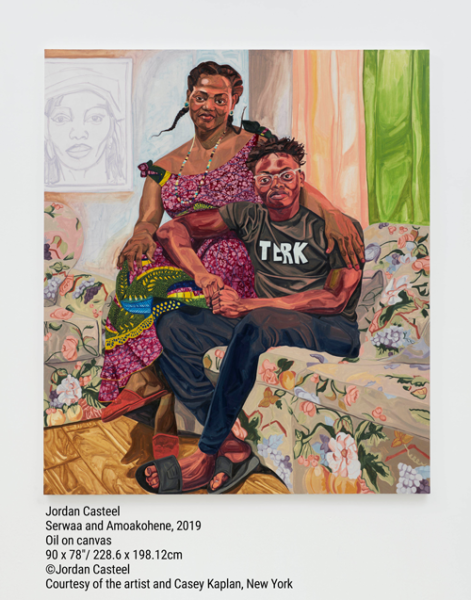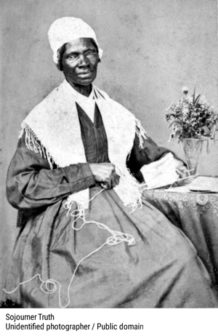
Letter from Lauren: Ain’t I A Woman, Too?
Ain’t I A Woman, Too?
Without Racial Equity, There Cannot Be Gender Equity
Dear Beloved Community,
 The late Dr. Vincent Harding, a Denver treasure and dear friend, often invoked the words of Dr. Martin Luther King, Jr., when speaking to the “beloved community.” Today, as I write to WFCO’s beloved community, I reach for his spirit along with other Black ancestors, such as Sojourner Truth. Truth was born into slavery, where her body was used as property for profit. After escaping with her infant daughter and then later using the court system to free her son from slavery, Truth became a leader of the abolitionist movement. At the 1851 Women’s Rights Convention in Akron, Ohio, where some asked that she not be allowed to speak, she asked the audience, “Ain’t I a Woman?”
The late Dr. Vincent Harding, a Denver treasure and dear friend, often invoked the words of Dr. Martin Luther King, Jr., when speaking to the “beloved community.” Today, as I write to WFCO’s beloved community, I reach for his spirit along with other Black ancestors, such as Sojourner Truth. Truth was born into slavery, where her body was used as property for profit. After escaping with her infant daughter and then later using the court system to free her son from slavery, Truth became a leader of the abolitionist movement. At the 1851 Women’s Rights Convention in Akron, Ohio, where some asked that she not be allowed to speak, she asked the audience, “Ain’t I a Woman?”
Our movements still leave women behind
Among the cascade of pain, sadness, anger, and hurt that our communities feel today lies a difficult truth. 169 years later, movements for suffrage, marriage equality, feminism, reproductive rights, #MeToo, and woke women’s marches for justice continue to struggle with what it really means to respond “yes” to Sojourner Truth. During Pride Month, how many of us remember that that LGBTQ+ rights movement was first ignited by trans women of color Marsha P. Johnson and Sylvia Rivera? When women’s outcomes for life itself are pre-determined by their background, what they look like, where they were born or where they live, how they pray, or their abilities, our movements still leave many women behind. Equity is authentically shared power and voice.
Without racial equity, there cannot be gender equity.
COVID-19 ripped the veil off any illusions about the essential contributions women of color make to our workforce, and the disparities they face in spite of them. Women and people of color are our nurses, grocery workers, and teachers. Women of color make up the majority of service, retail, and hospitality workers who are vulnerable to a tentative economy.
COVID-19 compounds the cumulative pain of centuries of oppression
The trauma of COVID-19 only compounds the ongoing, cumulative pain of centuries of oppression. Black and Latinx women and men are more likely to die from complications, we are at greater risk of losing our homes, and our children are most likely to be hungry and least likely to have technology for online learning. COVID-19 unflinchingly exposed underlying statewide systemic disparities in health care, education, housing, access to food, transportation and child care based on race, class, and yes, gender. To acknowledge these facts is not to deny that the pandemic has affected us all. It is to say that some Coloradans are more likely to lose their livelihoods or their lives simply because of who they are. It is to say Black Lives Matter – a movement founded by women.
While women across all intersections face inequality, we must acknowledge that white women need to be active in righting another unjust system. A Memorial Day video of a white woman weaponizing her privilege against a Black male bird watcher illuminated this dynamic. Her false accusations could have killed him. Seeds of distrust in those who call themselves allies were re-sown in Central Park. Just as white women can perpetuate systemic racism, they can use their privilege to demand an end to it.
I weep ancient tears I’ve stopped trying to hold back
 The murders of George Floyd, Ahmaud Abery, and Breonna Taylor add to a 400-year-old list of names of brutalized Black men and women. As a Black woman with many privileges, I weep ancient tears that I’ve stopped trying to hold back. I am the mother of three beautiful, loving, and strong Black children, including two Black sons. My younger son labors in the grocery industry helping to ensure that Colorado families have food on their tables. He is proud to do his part. After a day of hard work, I worry that he could be arrested, even killed simply for driving home. As he envisioned his future, my older son considered joining the military or becoming a police officer, to serve and protect, justly and with integrity. His path led him to service as a commended flight rescue RN. He flies into Navajo reservations where COVID-19 is unchecked due to a lack of running water and where indigenous women go missing – both stunning displays of the complex consequences of colonialism and white supremacy. My hopes and fears for my sons are ever present – along with my phone – as I work alongside you in this movement for gender equity.
The murders of George Floyd, Ahmaud Abery, and Breonna Taylor add to a 400-year-old list of names of brutalized Black men and women. As a Black woman with many privileges, I weep ancient tears that I’ve stopped trying to hold back. I am the mother of three beautiful, loving, and strong Black children, including two Black sons. My younger son labors in the grocery industry helping to ensure that Colorado families have food on their tables. He is proud to do his part. After a day of hard work, I worry that he could be arrested, even killed simply for driving home. As he envisioned his future, my older son considered joining the military or becoming a police officer, to serve and protect, justly and with integrity. His path led him to service as a commended flight rescue RN. He flies into Navajo reservations where COVID-19 is unchecked due to a lack of running water and where indigenous women go missing – both stunning displays of the complex consequences of colonialism and white supremacy. My hopes and fears for my sons are ever present – along with my phone – as I work alongside you in this movement for gender equity.
Even as that list grows longer with names we will never hear, my daughter, a painter, is celebrated for making us gaze at the humanity of men and women of color. Protesters march with cardboard signs insisting that Black Lives Matter just blocks from the Denver Art Museum and The New Museum in New York City where her canvases have done the same. Does her voice, her lived experience, her being – equally Black, equally woman – have an authentic place in this movement?
I am a grandmother to four members of the next generation of children of color to inherit our history. I wonder what the future will look like for my Black and Navajo grandsons. Will my granddaughter’s Asian heritage protect her from an unjust police encounter, or will her Blackness compound anti-Asian sentiment? What ceilings will this movement shatter for them, or will they be cut by the shards?
Women are called to bear the pain of those in our care, children not our own
The horrific video that sparked these protests shows George Floyd calling for his dead mother as his own life seeps away. Another truth behind my tears, and in the not-so-back of every Black mother’s mind, is hearing my own sons’ voices in that video. The cries of those unjustly incarcerated or in custody as African diaspora and Latinx refugees or immigrants haunt me, too. They all sound the same. I find that many women cannot turn away from the echoes of community pain and longing. Whether a Mama, Aunty, Grammy, teacher, neighbor, sister, or friend, the reality is so often that women are called to bear the pain of those in our care. Lives of “The Help” have depended on doing so for children not our own. Will you do the same for us?
Our Black sorrow is not new, but for many people these videos are a first glimpse into our heartbreak. “What can we do?” is too simple of a question. And simple answers are no match for systemic problems. I ask this beloved community instead, how can we peacefully, meaningfully, and effectively move forward? How do we use the trauma of today, of our history, to create a sustained better-yet-to-come? For WFCO, we commit to continued active listening, learning, and growing action through shared power and voice. The gender and racial equity we strive for starts with us. As the first woman of color to lead WFCO, I am acutely aware that historically we haven’t always done this well. Philanthropy is not only the sphere of the white and the wealthy. WFCO has come a long way on this journey and we commit to going further, in policy and in practice ongoing. We also commit to even more intentional and increased investments in women and girls of color. The executive committee of the WFCO board of trustees has approved the exploration of an exciting new project. Staff have been working for several months on the creation of the Women & Girls of Color Fund, a community-led field of interest fund that will invest in women-of-color-led and women-and-girls-of-color-serving organizations across Colorado.
“We are proud that this has been a proactive effort and it seems especially timely at this moment,” said Katie Kellen, chair of the board of trustees. More information will be shared in the fall.
We cannot succumb to nothing because we might make mistakes
I believe in my grief-weary soul that if we as women, ALL women, can commit to truly see, hear, honor, respect, and learn, then act – the world will change. We are the keepers of the culture. We are creators. I believe that our true, shared matriarchal power can create real solutions. But that means doing the hard, messy, intensely personal work of anti-racism as individuals, families, businesses, institutions, nonprofits, governments, and as advocates to really be better and hold ourselves accountable. Even when it’s uncomfortable and even when it means sharing privilege. We cannot succumb to doing nothing because we might make mistakes.
We must do more than just share the symbols of our beliefs. We must substantively do better. We begin by marching, but we will continue the work by creating tools and solutions and holding difficult conversations for years to come. Here are a few ways to start:
– Vote! Use your vote to elect officials and pass bills that advance your values. Let candidates know that racial justice is a priority for you and ask how they’ll stand up for people of color. Make sure you’re registered here. And don’t forget to take the census if you haven’t already done so.
– Contact your legislators. From your city councilperson to your U.S. representatives, elected officials need the input of their constituents to craft and pass legislation that serves their community. Find your legislator here and give them a call to share how you would like them to show up for communities of color, such as voting to pass a new bill that will improve law enforcement accountability. WFCO is proud to support SB20-217 Enhance Law Enforcement Integrity.
Continue to follow our public policy work, and the public policy work of other, women-of-color led organizations, such as Colorado Black Women for Political Action and COLOR, for more ways to advocate for racial justice at the Capitol. Look for our research later this month. Read about our WAGES and WFCO Relief Fund grantee partners.
– Listen and learn. There is no shortage of media from which we can learn about white supremacy, anti-blackness, racial justice, and allyship – here’s a list of books, movies, and podcasts where you can start. Listen to people of color about their experiences. Then use what you learn to take action in your community.
– Speak up. When you hear or see something that’s not right, speak up. Engaging friends and family in conversations about race can be hard, but it’s essential.
 Hope is important, but it is not enough
Hope is important, but it is not enough
I hope for a better future, where simply waking in the morning is not a cause for fear because of the color of one’s skin. I hope for a better future for my grandchildren, for your family, for all Coloradans for generations to come. Hope is important, but it is not enough, neither are shame, guilt, or fear. I am proud in 2020 to stand beside you, to be a Black woman addressing a movement of women and men fired up and ready for change. But, if I were to ask, “Ain’t I a woman?” would you work to make sure that the resounding answer is “yes?”
Onward,
Lauren Y. Casteel | President & CEO

